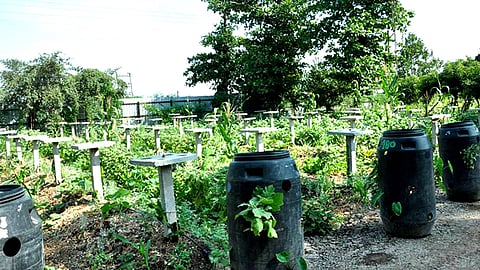The Eco Factory turns waste to wealth
Five years ago, Anand Chordia decided that Suhana Spices generates too much effluent as well as solid refuse like scrapped packaging material that finds its way to a landfill. As the company’s technical director, he felt, it was up to him to do something about it: so he met a number of scientists, NGOs and research institutes for advice and set up The Eco Factory Foundation (TEFF).
Believing in the ‘Waste to Wealth’ and ‘Waste to Health’ approach, the Foundation has established India’s first-ever waste management park with an awareness and learning centre which exhibits different techniques of waste management for individuals, communities and industries. Here, it has created a ‘food forest’ to ensure sustainable development and a unique concept of creating an ‘edible landscape’ model for schools, colleges and other institutions and organisations.
TEFF is also working to bring into focus various techniques of organic, natural, sustainable, chemical-free and Vedic – which is uses only natural organic materials - farming like permaculture, biodynamics and zero-budget natural farming. It is also training farmers hands-on in different farm-allied businesses with which they can make their practices sustainable. These include making cow dung pots and charcoal sticks, processing banana fibre, seed banks and beekeeping – and, in the longer term, agro- and eco-tourism.
A non-profit organisation registered under section 8 of the Companies’ Act, the Foundation is working to provide a sustainable lifestyle and farming solutions to rural and urban India. This activity includes inculcating one-acre farm economics and the right farm design principles as part of its farmer training programmes and conducting training for urban gardening. “My grandfather Hukumchand Chordia, who was a farmer, never used chemicals. I too have found that chemical-free farming can give good results if practised in an organised way,” he says.
TIFF also hosts groups of schoolchildren to show them how everyone can lead a sustainable lifestyle. Explaining that different kinds of waste need different treatment techniques, Chordia says the 3,000 tonnes of waste his farm generates every year, for instance, is all converted into useful materials: every household can follow these techniques.
The Foundation truly follows the principle of a circular economy: leading to sustainable farming in the rural area and converting waste into wealth in the cities. It can also be implemented in every industry and factory.
“We are living in an era where everybody is moving towards a more organic future,” Chordia adds. “Be it packed food, vegetables, soaps, beauty products or clothes, people are using less chemically-intensive techniques to lead a healthier lifestyle.” He admits, however, that the question of whether consuming organic products alone be enough will always remain.
The journey for TIFF and its founder goes on.

